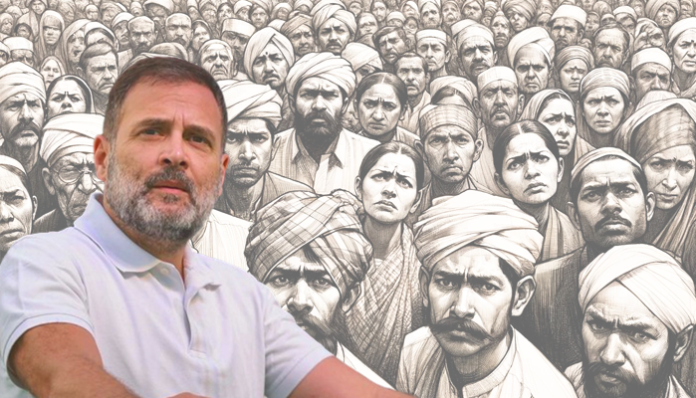
India is approaching towards Lok Sabha Elections 2024. With only a few weeks left to the general elections, the opposition leaders, especially Congress and specifically Rahul Gandhi, it trying to propagate a divisive narrative. His approach to caste politics has raised eyebrows among the masses as in almost every speech in the past few months he has tried to set a narrative that Other Backward Classes (OBC) and Scheduled Caste/Scheduled Tribes (SC/ST) do not have enough representation in the decision-making process and government jobs.
In some cases, he has raised questions about the hiring process of media houses and questioned if there are OBCs in the media groups. Instead of going for merit, Rahul Gandhi wants everything to revolve around caste. Gandhi argues for policies and measures based on caste representation. He has repeatedly called for a caste census in the country. After 75 years of independence, which Congress ruled for the majority of decades, Gandhi still wanted India and Indians to limit their thinking to only one parameter and that is caste.
His approach has sparked debates on its effectiveness and relevance in the socio-political context of modern India. Though Gandhi and other opposition leaders want Indians to believe that caste-based politics is the only way to move ahead, the younger generation might not resonate with the idea. The younger generation has priorities that include education, employment and a cosmopolitan lifestyle that transcends caste and religious boundaries.
Furthermore, the younger generation wants to disconnect itself from the concerns for caste in their personal and professional lives. It can only happen if the leadership in the country let people live beyond the caste lines. The youth of India has aspirations for meritocracy and equal opportunities. The number of people who are concerned about their caste representation is notable but it is decreasing at a remarkable pace. India cannot progress while living like a frog who does not want to come out of the ‘caste’ pond.
Rahul Gandhi recently promised to conduct a nationwide caste census and remove the 50 per cent cap on reservation. He claims that it would help to ensure the representation and rights of SC/ST and OBSc. He presents as if his demand for caste census is a “direct challenge” to the Bharatiya Janata Party-led Government of India as he claims that the current government has failed to adequately address the needs and rights of these communities.
However, in contrast, Prime Minister Narendra Modi-led central government has focused on development and inclusivity since day one. The main aim has consistently been to uplift the marginalised and low-income groups. The central government initiatives aimed at providing housing, water, sanitation, food, medical facilities and loans to start businesses are part of PM Modi-led government to bridge the gap between different socio-economic groups in India. PM Modi’s approach has been to emphasise extending support and opportunities to the marginalised and he has done it while highlighting his OBC background as part of his appeal to these communities.
The political strategies of Gandhi and PM Modi show that there is a clear divergence in their approach when it comes to addressing India’s complex social fabric. While Gandhi is banking on the mobilisation of caste identities as a tool for political gain, Prime Minister Narendra Modi’s main focus has remained on development and economic upliftment across all sections of society. BJP’s “Sabha Saath, Sabka Vikas” is one of the most successful program as the aim remained around development of all.
Notably, the political discourse around caste and religion is not in Indian politics. One of the most shocking statements that came from a Congress leader was in 2006 when then-Prime Minister Manmohan Singh claimed that Muslims have the first right to India’s resources. His statement sparked a considerable debate about minority rights and resource allocation in the country. The statement by Manmohan Singh and the now-narrative being set by Rahul Gandhi highlights the ongoing struggle to leave divisive politics behind and move ahead to promote a forward-looking vision of meritocracy and equal opportunity.
As the country is moving closer to the Lok Sabha Elections, the political landscape is increasingly becoming a mirror image of the complex interplay of caste, development and identity politics. Every party out there is seeking to form its base through different narratives and promises. The electorate now must choose the right candidate by choosing development and leaving behind divisive politics to ensure India moves ahead as a family.







